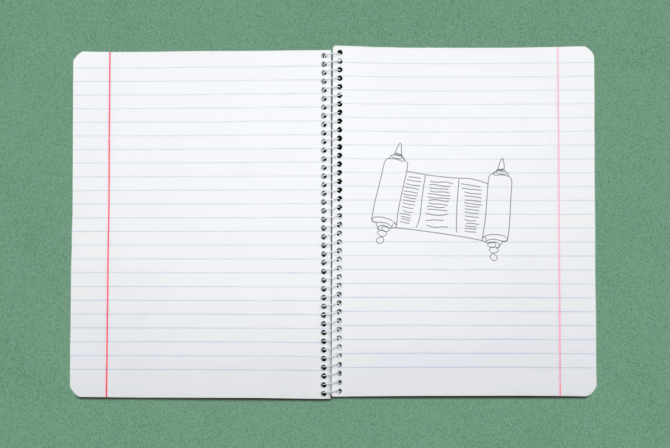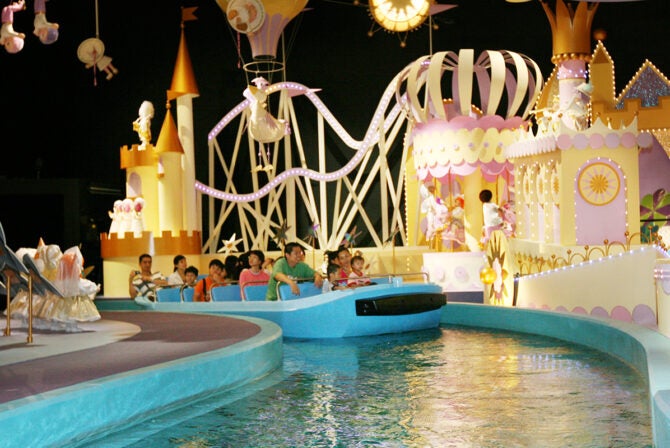The title of Netflix’s new “hot rabbi” show was supposed to be “Shiksa,” the maybe slur (depending on who you ask) for a non-Jewish woman that would’ve certainly gotten at least part of the Jewish community incensed. But the actual title of the show, “Nobody Wants This,” is quite a power move. It’s a name that just begs to be toyed with in a negative review, one that requires the chutzpah to believe the show is something people want. And with a cast helmed by Kristen Bell as the “shiksa” Joanne, Adam Brody as Rabbi Noah Roklov, “Succession” star Justine Lupe as Joanne’s sister Morgan, “Veep” star Timothy Simons as Noah’s brother Sasha and legend of screen and stage Tovah Feldshuh as the Roklov family matriarch, I too would be feeling a bit of hubris.
“I created this show based on all the ways that finding the right person can be so hard. Nobody wants this, but we do, and that’s all that matters,” is how the show’s creator Erin Foster, an actor, writer, podcaster and the co-owner of the Favorite Sister clothing brand, explained the title. The series is based on her own relationship dating a nice Jewish boy, though not a rabbi, who eventually became her husband, Simon Tikhman, with whom she just had a first daughter named Noa. Foster converted to Judaism ahead of her marriage to Tikhman, and watching this show, you definitely feel an underlying love for her chosen religion.
In the weeks since I first watched early screeners of the show, I’ve spent a lot of time thinking about the title (because of course, I had to go all talmudic scholar about something I am 99% sure was just not that deep for its creators). But something about “Nobody Wants This” connected with me in such a visceral way during one particular scene in the last episode of the show, in which Esther, Noah’s sister-in-law played by Jackie Tohn, walks in on her teen daughter cutting her bat mitzvah dress in the event hall bathroom. After apologizing for cursing after getting caught and begging her mom not to ground her, Miriam, played by a wonderfully relatable and sweet Shiloh Bearman, explains, “I hate my bat mitzvah, I hate this dumb theme, and I hate this stupid dress.”
You see, Miriam didn’t come up with her theme, which is NYC. She wears a sequined modest shiny red dress (that I kind of love, but she does not), and has a bat mitzvah sweater that reads “Apple + Pizza + Jewish star = Miriam!” that she finds nonsensical. We learn that her grandmother Bina (Feldshuh), a soviet immigrant who had to hide her Judaism in Russia, and who came to the U.S. with nothing and built a life for herself, is paying for the lavish party — and therefore, she gets to call the shots.
I can’t say we’ve all been there, but I know a lot of us have — caught up in the desire to honor the people whom we love and whom have sacrificed so much for our happiness, and wanting to honor Jewish faith and traditions which have so often been put up again annihilation, that we let go of what it is we really want, from career choices to wedding ceremonies to yes, sometimes significant others.
And yet, the beauty of so much of Jewish tradition is how we’ve managed to change and adapt when nobody wants the old. Most girls have bat mitzvahs now, even if the bat mitzvah is just 100 years old and our tradition has been around for five millennia. We live in a time of b-mitzvahs when Jewish teens can come of age in a way that feels authentic to their gender presentation. More and more rabbis in interfaith relationships themselves are being accepted, and the rabbinical pulpit is so diverse. Judaism has survived because when people didn’t want something, they spoke up and they changed it, in many people’s eyes for the better. And for those who didn’t want those changes? They still have congregations to practice their religion in a way that works for them.
It’s clear that “Nobody Wants This” was not created for a Jewish audience specifically. Creating a show for such a small percentage of the population, after all, would be an unwise choice for a streaming platform as huge as Netflix. Still, the show did a fair amount of due diligence when it comes to Jewish details — the writer’s room was stacked with Jewish writers, including Foster herself, and her rabbi served as the show’s rabbinical consultant.
There are things about Jewish representation that this show does well. Not all of Rabbi Noah’s sermons are inspired, but they’ll definitely feel familiar to those of us who have been to services. An impromptu Shabbat celebration is endearing, as is Noah’s genuine love for his faith. A conversation about what Jewish men look like, which brings up both young Mandy Patinkin and Paul Rudd as a subversion of expectations, makes for both wonderful comedy and Jewish vindication. And even a joke about the old reviled stereotype of Jews having sex through a hole in a bedsheet was a risky endeavor that I think the show pulled off.
And then there are things about the Jewish experience that are uncomfortable to see. While I’m not sure people would so openly and contemptuously call someone a shiksa at a (Reform? Conservative? It was a bit hard to read!) synagogue, it’s undeniable that the way some Jewish communities talk about dating non-Jews, and especially non-Jewish women, isn’t far off from what we see here. The line “shiksas are for practice” is a real and painful one that many have heard. And in a way, the show is an opportunity for some of us to look at ourselves in the mirror — as communities and individuals — and ask do we want this? Even if we have complex feelings about intermarriage, is it time to forego some of these traditions and viewpoints?
But if the show is thoughtful about how it portrays Jewish men, it’s a bit more negligent when it comes to its Jewish women and mothers. There isn’t a single Jewish woman here who doesn’t seem to be taking things too seriously all the time, who knows how to let loose and have fun. In the old trope of Jewish-man-dates-shiksa, there is often an unbearable Jewish woman put in contrast with said free-spirited shiksa, and this latest hot rabbi project gets pretty close in giving us another repeat of Lisa Edelstein’s Ali in “Keeping the Faith.”
There are still Jewish women I found myself rooting for. Jewish actress Jackie Tohn makes Esther, Sasha’s wife and Noah’s sister-in-law, into a fully fledged badass who has some real chemistry with her on-screen husband and is also the kind of friend that everyone wants in their court. Noah’s ex-girlfriend, the stunning Emily Arlook (“Grown-ish”), is at first portrayed as a bit of the stereotype of an unhinged Jewish girlfriend who, after sleuthing, finds the engagement ring Noah was saving for a proposal and puts it on her finger like it’s no big deal, leading to their actual breakup in the first episode of the show. But she’s also the mythological ex: beautiful, smart, glamorous, and Joanne is absolutely obsessed with her. Even though it’s not established in the show, the viewer can assume Noah played a part in the kind of insecurity that made her feel like she needed to take the reins in her hands after three years without a proposal; it seems pretty clear that our hot rabbi was not-so-hot boyfriend to Rebecca. I would definitely watch a second season for more of her.
Because the title made me do it, there are some things that I — and I’m guessing many fellow Jewish viewers — did not want from this show: another representation of an angry, controlling Jewish mom (even if she’s played by genius Tovah Feldshuh); another show or movie that only portrays Jewish women as uptight brunettes in contrast to the hot blonde shiksa with stylish clothes and whose hair blows with the wind every time she enters the room; another show about an interfaith couple that doesn’t show any happy and successful interfaith relationships, which represent the majority of Jewish couples in the country at the moment; another man married to a fine Jewish woman who somehow still cheats on her with a blonde shiksa (OK, so this didn’t happen in the first season but things seem to be headed that way and I’m not happy).
Yet there were so many things in this show that I did want. It is genuinely a good rom-com, with lots of insightful lines and funny moments about how unhinged we can all get when it comes to love and family. It has lovable characters and actors with lots of great chemistry. It has an absolutely wonderful (and, I should say, hot) female rabbi played by Jewish actress Leslie Grossman, who I fell in love with and who I think may actually be better at the pulpit than our friend Noah. It has really funny dialogue that made me howl with laughter (I will never think of Prego the same way again!). Joanne is a non-Jewish character who treats Jewish tradition with curiosity and reverence — she is there for all the Havdalahs, Shabbats and visits to Jewish summer camp without mocking any of it. She treats Noah’s job and faith as important, so much so that she would rather leave him than jeopardize the career that he cares so much about. And the show shows Jewish love — romantic, familial, in such a warm way.
When Esther finds Miriam in the bathroom, unhappy on one of the most important days of her young life, she is there for her, and like Jewish tradition often does, she decides to change. “I don’t know why I’ve been caught up playing by the rules when no one else is,” Esther tells her daughter. “This is your day, and we’re gonna fix this. Give me the fucking scissors.”
“Nobody Wants This” portrays one aspect of the diverse, wonderful Jewish story. It falls into some of the worst tendencies of the Jewish-man-falling-for-the-shiksa trope. And yet in some ways, it is fresh, new and captivating, especially how it focuses on the perspective of the shiksa and potential Jewish convert herself. And if there’s a second season that offers Netflix viewers a peek into the fascinating conversion process to Judaism? Well, I’d definitely want that.








